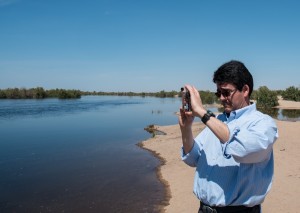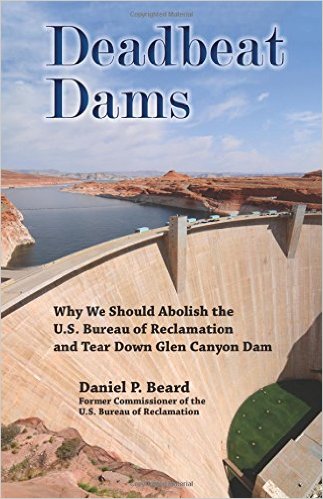I’d like to take issue with some recent comments by Dan Beard and Mike Connor, two former commissioners of the U.S. Bureau of Reclamation, about the agency’s future. (Audience sees closeup of Fleck crawling out on tree limb. Camera zooms back to show that it is the only tree for miles around, with no buildings and therefore no chance of rescue. Audience hears sound of sawing.)
Beard
In a weekend New York Times story Beard, who headed the Bureau during the Clinton administration, renews his call for the agency’s elimination:
Daniel P. Beard, a bureau commissioner during the Clinton administration, said the bureau should be abolished, with the authority for water management returned to the states.
“Here we are in the worst drought, climate change is providing a significant impact, and the Obama administration is just studying the problem,” he said. “They should transition to become an environmental agency, and they should just assist local and state agencies to solve water problems in the West.”
It’s an argument Beard lays out in his appropriately titled new book Deadbeat Dams: Why We Should Abolish the U.S. Bureau of Reclamation and Tear Down Glen Canyon Dam. It’s an important book, raising challenging arguments that you need to wrestle with if you’re thinking about water in the western United States. But I disagree with Beard on this central point.
Water scholar and attorney Sarah Bates and Cadillac Desert author Marc Reisner wrestle with this question in Overtapped Oasis: Reform Or Revolution For Western Water, a book that serves as a sort of odd sequel to Cadillac Desert, helpfully clarifying (walking back?) some of Cadillac Desert’s central themes. Their quick laundry list of the problems posed by abolishing the Bureau makes a central point – the Bureau does a bunch of stuff, and if the agency were to be eliminated, someone would still have to do all that stuff:
[I]ts abolition would create a political, administrative, and water-rights nightmare…. Who would then “own” its canals and dams? What about the rights to more than 30 million acre-feet of water it provides? Who would be responsible for dam maintenance? For emergency decisions regarding drought allocations or fish-flow releases?
Bates and Reisner then raise an important political reality that I think undercuts Beard’s argument:
[A]ny attempt to abolish the Bureau of Reclamation would be fanatically resisted by many politicians and organized constituencies in the western states, precipitating a political battle that may not be justified by the results.
This is the “water nobility” about which Beard writes in much detail, and any attempt to abolish the current Bureau structure would, I believe, disproportionately empower this group in the political processes needed to create a replacement structure to do the stuff now done by the Bureau. These folks have really good lobbyists and lawyers.
Connor

Deputy Interior Secretary Mike Connor watches water flow through the normally dry Colorado River bed at San Luis, on the U.S.-Mexico border, March 28 2014, photo by John Fleck
I turn my attention now, gingerly, to the comments of Mike Connor, who was the Obama administration’s first Commissioner of Reclamation, now Deputy Secretary of Interior, and (important disclosure) has generously spent some significant amount of time teaching me about the governance of water in the western United States. (Audience hears sawing of the branch cease, replaced by cracking sound.) In the Times, Connor correctly suggests that the West’s water infrastructure needs a massive rethink:
“We have to think differently,” said Michael Connor, the deputy secretary of the Interior Department, which includes the Bureau of Reclamation. “It’s not enough just to conserve water. We need to rethink these projects. We have a lot of infrastructure, but a lot of it doesn’t work very well anymore. We need to undertake what amounts to a giant replumbing project across the West.”
The way Connor says it supports a central theme of the Times story that I think is wrong: the implication that the Bureau and western water management have been humming along unchanged since the days of Cadillac Desert and have suddenly come to the realization: “Hey, a giant replumbing is needed!”
The whole project of my book challenges that. When I set out to write it some years ago, it was with a post-Cadillac Desert notion that a giant replumbing was needed. What I found again and again, in fact, was that the replumbing has been underway for a while (urban water conservation all over, ag-to-urban transfers galore, re-operation of reservoirs, an environmental flow through the Colorado River Delta for chrissakes). Path dependance and historical contingency make this stuff really hard. People optimized their communities and their lives around the old system. You can’t just kick them off their farms or shut down their city water systems willy nilly. Even if you wanted to (and I think there are important questions of equity and justice that make willy nilly a bad idea), these people fight back, and they’ve got good lawyers. But understanding what replumbing is already underway, what has and has not worked, and what the impediments are as seen through the lens of these replumbing efforts, is the critical piece.
I’m pretty sure Connor would agree with this last bit, the idea that the replumbing is already underway, since’s he’s one of the one of the people who taught me about it.
Let’s just agree to blame the reporter. (Camera zooms back in to see Fleck’s desperate scramble to crawl back before branch breaks.)


in a recently congressional oversight hearing with the Bureau of Reclamation – when asked by the chairman for their plans regarding additional water storage …. none was the reply……not in 10 years nor 20 years or even 30 years. so the chairman asked if they were not from the party that believed in global warming and banged his gavel ending the disgusting hearing…….
Mr. Fleck:
Just for context, Marc Reisner wrote Cadillac Desert in 1986, and co-authored Overtapped Oasis in 1990. Marc was a classmate of my wife at Earlham College (1970), and was greatly missed after his death in 2000.
I fear that no amount of “replumbing” will ever address the structural problems of climate change, over-population in arid environments, and the dependence of unsustainable agriculture and urban sprawl on the very “conservation” projects that Marc decried 30 years ago.